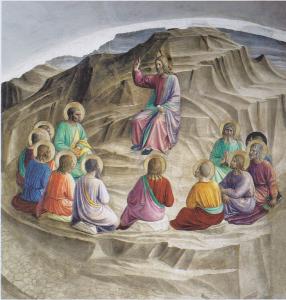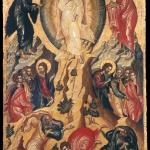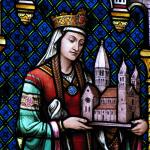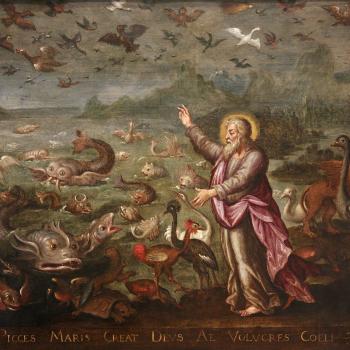
While everyone is called to embrace some forms of self-discipline to help fight off and overcome the influence of various bad habits in their lives, a few are called to pursue that as their life mission, to represent the good of self-discipline through a life of asceticism. This is what the monastic calling is about. People are called to it so that they can serve as special signs of the kingdom of God to the world, showing everyone a unique way of life, which not only transcends ordinary expectations, but can and often leads to all kinds of extraordinary deeds and relationships with others. Those who are called to an ascetic way of life, perhaps to be even hermits living apart from others, are meant to do so not merely for their own sake, but rather, for the sake of everyone else. They are to live out their lives as radical representations of self-denying love, and in doing so, they find themselves capable of even bearing the burdens of others with their labors. For they become, as it were, a conduit of grace in the world. That is ascetics, even if they are true to the way of life given to them, are not doing so to reject the world and those within it, but rather, to be of service to them, to become fountains of grace, helping people who do not have the means or ability to help themselves. In a way, they become like angels, as they become more and more focused on the spiritual side of their being, even as, also like angels, their existence, their prayers, are for the sake of others, not just for themselves. Their whole life should become, as it were, an extended prayer, as Abba Isaac in the Conferences suggested:
This, then, is the goal of the solitary, and this must be his whole intention – to deserve to possess the image of future blessedness in this body and as it were to begin to taste the pledge of that heavenly way of life and the glory in this vessel. This, I say, is the end of all perfection – that the mind purged of every carnal desire may daily be elevated to spiritual things, until one’s whole way of life and all the yearnings of one’s heart become a single and continuous prayer. [1]
If they live out their life as is expected of them, ascetics can become signs of the kingdom of God on earth. They can show that the work of the immanent eschaton, Christ, continues in the world. In and through their lives, in some extraordinary moments of it at least, they can demonstrate to everyone else a foretaste of the glories which are to come. They still have their own connection to the world and temporal existence. They still have to go through bodily death and resurrection in order to fully integrate with the eschaton.
The immanent eschaton came into the world to draw all things up into eternal glory, and so the immanent eschaton gives all kinds of grace to the world, grace which will reveal itself in various signs and portents, such as the glorious and extraordinary activities of holy men and women whose stories have been remembered and passed down through the generations. Their actions can often appear strange to us, and certainly, are not always acts which should be repeated by others. Everyone has their mission, their representation of the kingdom of God, which means, their own ways to embrace it, a way which must relate to the context in which they find themselves. This is why, though some might have become full of grace by showing extraordinary patience and endurance, such as seen in the example of so-called pillar saints, we should not assume, just because they found and shared grace in that fashion, it is meant to be repeated by others.
Some ascetics, though they work for the benefit of the world, though they bring grace to the world through their lives, though they show something of the extraordinary unearthly nature of the kingdom of God by the way their lives sometimes, seem to leave the world entirely behind; in reality, they are never completely separate from the world, they just have a unique place within it. Sometimes, that means, their place is not with common society, not even with their fellow humanity but with other parts of creation, such as seen in those who formed unique bonds with other forms of animal life:
There was an anchorite grazing with the antelopes and he prayed to God saying: “Lord, teach me in what I am lacking.” A voice came to him saying: “Go to such-and-such coenobion and do whatever they order you.” He entered the coenobion and stayed, but he did not know how to serve the brothers. The junior monks started instructing him how to serve the brothers, saying: “do this, stupid,” and: “Do that, crazy old man.” Distressed, he prayed to God saying: “Lord, I do not know how to serve men; send me back to the antelopes again.” Released by God, he went off again to the countryside to graze with the antelopes. [2]
Living with the antelopes, the anchorite shows us that the kingdom of God transcends humanity. It can be and is encountered by all forms of life. The anchorite found it difficult to engage humanity because the grace and mission given to him gave him natural affinity with the rest of the animal world. In doing so, he took on an aspect of human nature which has become woefully neglected, that is, the call to be a caretaker and provider for all living beings. In doing so, he also showed us how the kingdom of God is for the whole of creation: even antelopes have a place in the kingdom of God. Obviously, we are not meant to conclude that this is true only for antelopes, but rather, what is true for them, is true for all forms of life. Many other stories of ascetic saints provide examples of this by the special kinds of interactions they have with the world around them. Sometimes, this led to an interdependent relationship with some animal, as the animals is shown to have a mission in the world to present to us the glory of the kingdom of God as well. This was the case of John the Hesychast, who found he not only had a lion for a companion, the lion had its own role, which was, to serve as his protector:
Out of a wish to reassure John, who had felt some slight fear, he sent, as a visible protector, an enormous and terrifying lion to protect him day and night from the plots of the wicked barbarians. The first night that he saw the lion lying beside him he naturally felt some slight fear, as he himself related to me; but when he saw that the lion followed him day and night as his inseparable companion and warded off barbarians, he offered up hymns of thanksgiving to God for not ‘releasing the staff of sinners onto the lot of the righteous.’ [3]
Humans and animals have a shared destiny, and that destiny is the kingdom of God. Many great ascetic saints, who otherwise might have seemed to have been alone in the world, were not alone, because they had animal companionship. Their asceticism allowed them to form better relations with the animal world, presenting us a sign of the eschatological glory which we will all experience. We should not be surprised about this, for we have been told that the wolf shall lay next to the lamb (cs. Isa 11:6-9). No one, not even a hermit, is an island unto themselves. Hermits are called to live their lives in unique ways, and if they do so properly, if they embrace the holiness given to them in their mission, they will present to us a sign of the kingdom of God. What is important for us is to look for that sign and try to understand it and its meaning for us. When we do so, we should then begin to see the world and what is in it in a new light. Everything in it, everything in creation, has been created and has its proper place in the unity of creation, and so everything has its place in the transfiguration which is to come, when all things find themselves drawn up into eschatological glory.
[1] John Cassian, The Conferences. Trans. Boniface Ramsey, OP (New York: Newman Press, 1997), 376 [Tenth Conference; Abba Isaac].
[2] John Wortley, trans., The Anonymous Sayings Of The Desert Fathers: A Select Edition And Complete English Translation (Cambridge: Cambridge University Press, 2013), 55 [N.62].
[3] Cyril of Scythopolis, The Lives of the Monks of Palestine. Trans. R.M. Price (Collegeville, MN: Cistercian Publications, 1991), 231 [Life of John the Hesychast].
Stay in touch! Like A Little Bit of Nothing on Facebook.
If you liked what you read, please consider sharing it with your friends and family!
N.B.: While I read comments to moderate them, I rarely respond to them. If I don’t respond to your comment directly, don’t assume I am unthankful for it. I appreciate it. But I want readers to feel free to ask questions, and hopefully, dialogue with each other. I have shared what I wanted to say, though some responses will get a brief reply by me, or, if I find it interesting and something I can engage fully, as the foundation for another post. I have had many posts inspired or improved upon thanks to my readers.













